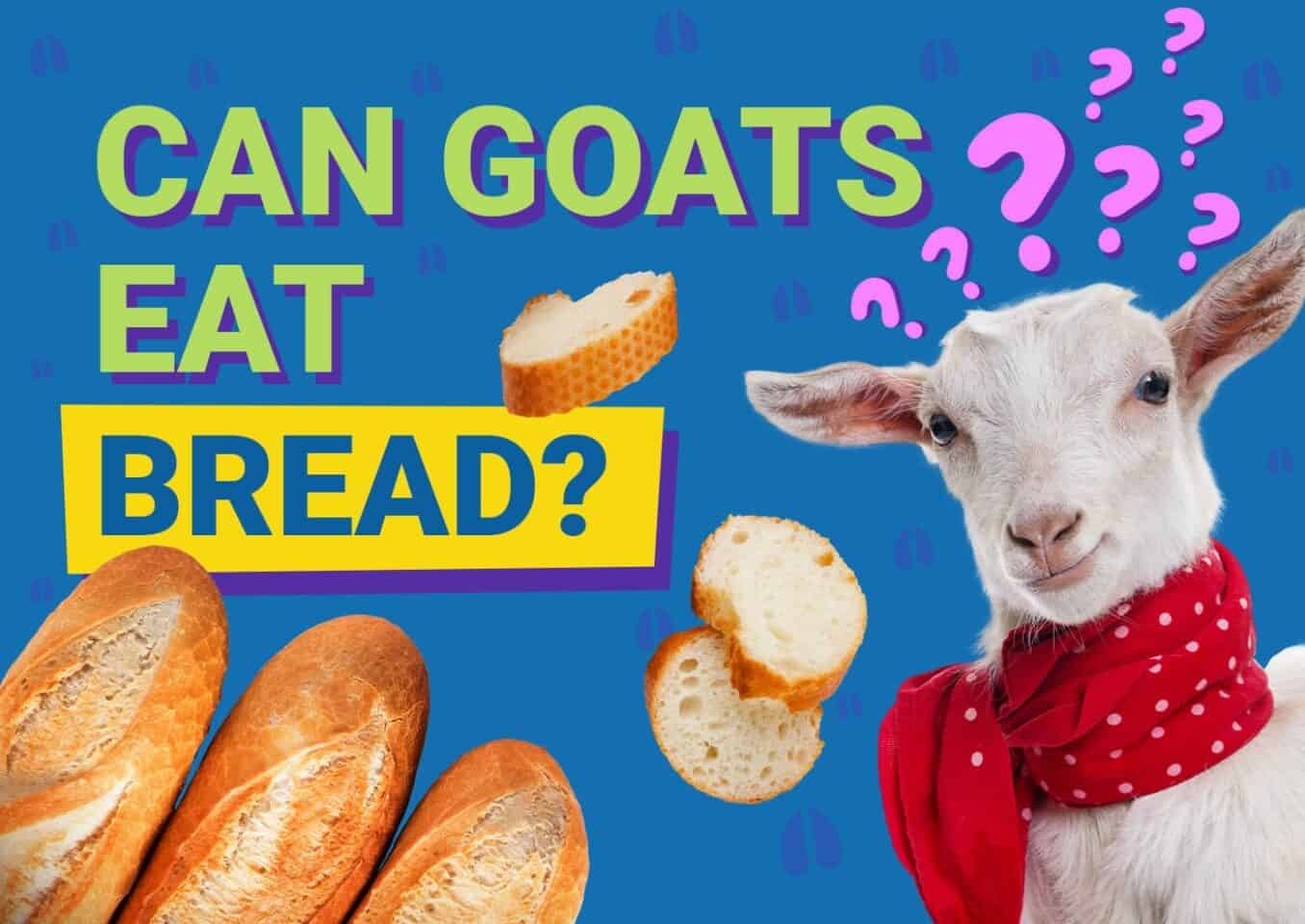Goats are exceptional animals that keep your fields clear and provide milk for cheese and other products. Goats have a reputation for being living garbage cans that can consume anything, but while they can dine on a wide variety of edible items, they can damage their digestive systems if the animals aren’t watched closely.
Goats are herbivores, and they’re happy to munch on a piece of bread, but is bread alright for them to eat? In small quantities, bread is ok for goats to consume, but the primary source of their diet should come from hay, grass, and vegetables.
Like sheep, cattle, deer, and elk, goats are ruminant animals. They have a complex digestive system with four stomachs, and starch and fiber are vital for the animal’s health and development. High-starch food like bread is beneficial to a goat, but you have to be selective when choosing bread types.

Which Bread is Healthier for Goats?
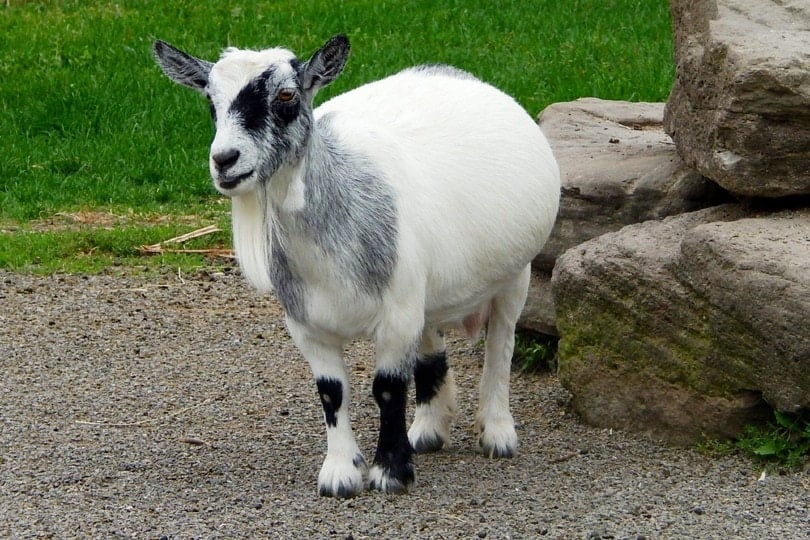
Commercial bread makers are only concerned with how their products affect humans, and some of the additives, flavoring, and preservatives are not beneficial to a goat’s digestive system. Making freshly baked bread for your goat is more laborious than grabbing a bag from the grocery store, but you can control what goes into the recipe and prevent the animal from eating anything harmful.
Wheat Bread
Wheat bread is high in fiber, and wheat starch is beneficial to the goat’s digestive health. If you buy wheat bread at the grocery store, check the ingredients for unnecessary or harmful components. Several years ago, commercial bread makers used a chemical to improve the elasticity of the dough, but when a whistleblower exposed the truth about the substance, the bakers wisely changed their recipes. The same chemical was used to manufacture yoga mats, but luckily, it’s no longer a danger to humans or goats. When you see a long list of unpronounceable chemicals on a bag of bread, set it aside and look for wheat bread made with flour, yeast, sugar, and water.
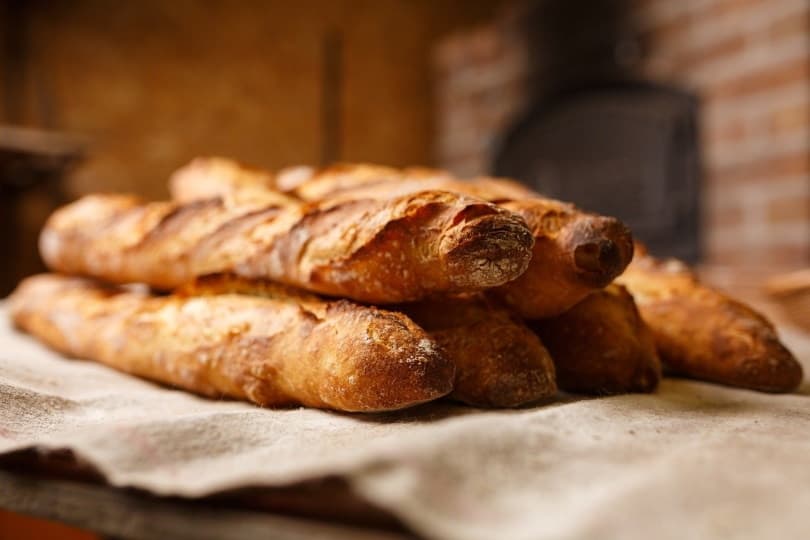
Sourdough Bread
Goats can eat sourdough, and it’s healthier for the animals than wheat bread. It contains less dietary fiber than wheat and white bread, but it has half as much sugar. Small amounts of sugar are ok for a goat, but it’s best to choose bread with little or no sucrose. Once you build a homemade sourdough starter, you can make several loaves of bread every week and save a bundle at the grocery store.
White Bread
Although it’s not as nutritious as wheat or sourdough, white bread is a healthy snack for goats. However, some brands are loaded with sugar and should be passed over for loaves with less sugar. The blandest tasting bread is the healthiest type for your goats. Although determining what portion of bread is safest for goats depends on the species, age and health, you typically shouldn’t feed a goat more than a loaf of bread every day.

Which Bread is Unhealthy for Goats?
Although a piece of pumpkin bread or banana bread will not harm a healthy goat, you should focus on products with high fiber, high starch, and low sugars. Sweet bread sometimes has as much as 1 ½ cups of sugar per loaf, which is unhealthy for a daily bread treat.
Sugary bread is not as beneficial as plain bread, and you should never feed bread with chocolate to the animal. Chocolate contains a component called theobromine that’s toxic to goats. While a small piece may result in an upset stomach, a bag of chocolate could kill the animal. Here are some of the bread products to avoid:
- Coffee cake
- Chocolate banana bread
- Doughnuts
- Cakes
- Cookies
- Seasoned crackers
- Garlic and onion-flavored bread
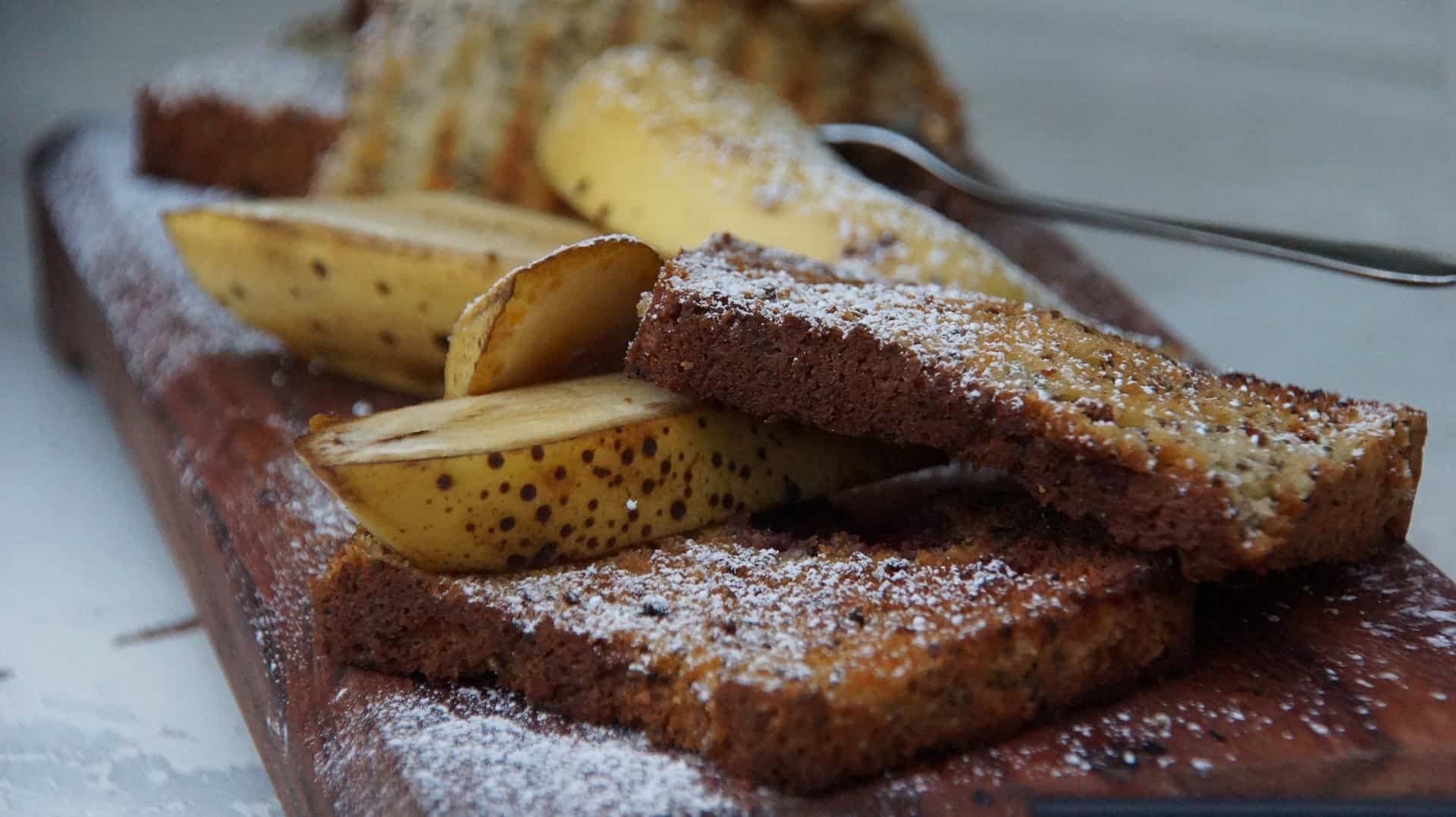

What is the Ideal Diet for Goats?
Goats require a balanced diet that’s rich in proteins, carbohydrates, vitamins, and minerals. Although some goat farms have limited pasture areas, pasture foraging is the best option for ensuring your goats stay healthy. Goats are herbivores, and a diet that reflects their eating habits in the wild is more beneficial than a commercial diet.
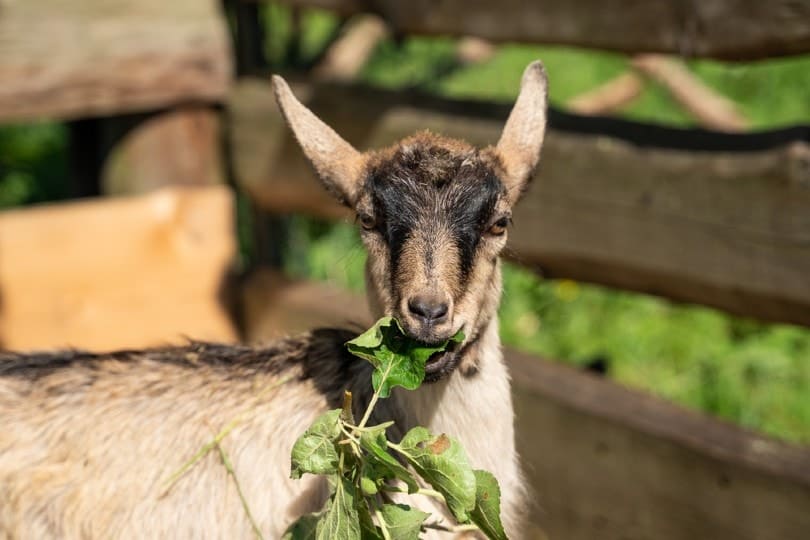
Grass
Pasture grasses such as Bahia, Sudanese, sorghum, clover, and millet contain the long fibrous material beneficial to the goats’ unique rumen. Unlike commercial feed and grasses, pasture grasses contain more vitamins, fiber, and protein. Also, a goat’s digestive health is dependent on an abundance of healthy bacteria and limited harmful bacteria. Pasture grasses produce fewer problems with parasites and gastrointestinal conditions than commercial feed.
Hay
If you live in an area with mild winters and your herd can forage year-round, you don’t have to rely on hay as a food source as much as farmers in colder climates. Hay provides fiber and protein, but it lacks vitamins and minerals. In colder climates, hay makes up the bulk of a goat’s winter diet, but it’s supplemented with fruits and vegetables to keep the animals healthy.
The quality of the hay can make a big difference in your goat’s gut, and you should always purchase high-quality hay that is light in color and dry. Wet hay with mold should be avoided at all costs. The mold can cause a bacterial infection that can kill the animal.
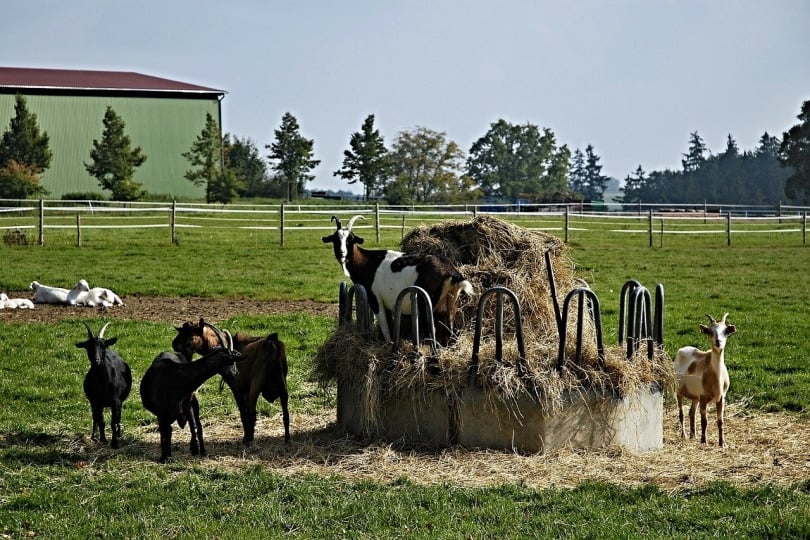
Fruits and Vegetables
Serving vegetables and fruits to your goats provides them with essential nutrients like vitamin C, Vitamin A, and Vitamin D. Goats love eating produce, and luckily, they can help you eliminate some of your food scraps. In addition to the meat from fruits and vegetables, they can munch on banana peels and vegetable skins. Some of their favorite fresh treats are tomatoes and melons.
Mineral Blocks
You can buy mineral supplements to add to your goat’s feed or hay, but one of the most efficient ways to deliver minerals is with mineral blocks. The blocks contain salt, calcium, and phosphorus to keep the animal’s digestive system healthy, and the goats typically lick the blocks throughout the day. When a storm approaches, the blocks should be removed and stored in a dry location. Rainfall can dissolve the blocks if they’re left outdoors too long.
Grains and Treats
Vitamin-rich grains are a healthy addition to a goat’s diet, but some farmers use grains as treats if they rely more on foraged grasses for the animals’ sustenance. One of the most beloved treats for a goat is sweet feed. It’s a healthy commercial product that contains sweet molasses and rolled oats. The molasses provides iron and sugars that help the goat’s digestion.
Another popular treat for goats, black oil sunflower seeds, is loaded with iron, selenium, zinc and vitamin E. Goats love the seeds, and humans drinking their milk can appreciate how the seeds enrich the milk’s fat content. Adding a small treat of black oil sunflower seeds each week to a herd’s diet can promote healthy muscle development and lustrous coats.

Which Food Items Are Harmful to Goats?
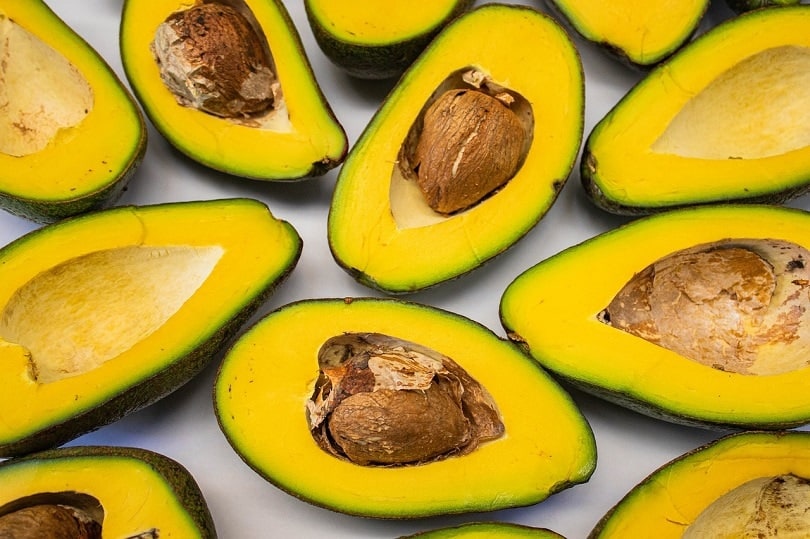
Although some people assume that goats have iron stomachs because of the diversity of their diets, goats can become ill or worse from eating the wrong food. Scraps from your dinner table are safe for goats as long as they do not contain meat, dairy, or processed food. Goats may attempt to eat meat if they’re starving, but their digestive system is not engineered to process it, and they can become gravely ill if they consume too much. However, goats are not fond of meat and bones, and they’re unlikely to eat them if they’re healthy. Here are some other everyday items to keep away from goats:
- Avocado
- Chocolate
- Rhubarb
- Palm leaves
- Milkweed
- Eggshells
- Fish remnants
- Cherries
- Dairy products
- Poultry and beef
- Cat food
- Dog food
- Nightshade varieties
The area surrounding your pastures or enclosures can also produce toxic plants that are harmful to your goat. Although the ASPCA’s poisonous plant lists that are available online only apply to cats, dogs, and horses, you can check with a ruminant veterinarian or agricultural agent for a list of local toxic plants. Three of the deadliest plants that grow wild in rural areas are datura, azalea, and rhododendron.
The flowers, seeds, and foliage of these plants should never be in close proximity to feeding bins or foraging pastures. Goats are not attracted to the toxic plants as much as grass or hay, but the seeds are the biggest threat—especially from datura. Cows, horses, and goats have been accidentally poisoned when datura seeds are blown into a seed or pellet mixture from the wind.

Final Thoughts
Throwing your goats a slice or even a whole loaf of bread every week can be a healthy addition to the hungry creatures’ diets. Homemade bread is the most nutritious, but you can find commercial loaves without added colors or preservatives in the grocery store. Keeping the animal’s digestive system in balance is challenging, but you can supply grasses, hay, produce, and grains to ensure your goats stay fit and healthy.
- You may also want to read: Can Goats Eat Bananas? What You Need to Know!
Featured Image Credit: Gamzova Olga, Shutterstock
